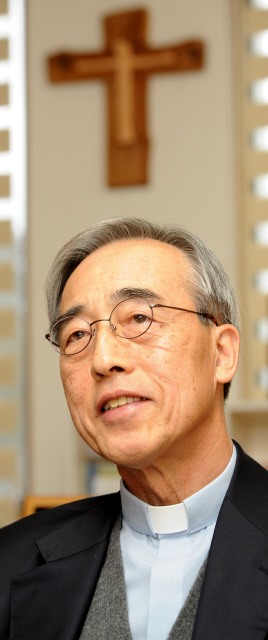Pope Francis coming to Korea to share a ‘gospel of consolation and hope’
 |
Bishop Peter Kang U-il
|
Aug. 14-18 visit will have Pope presiding over masses and meeting vulnerable members of society
By Cho Yeon-hyun, religion correspondent
“We can’t have a ritual mass for love to Jesus Christ in the same place where people who are grieving over losing their children to the sea were chased away.”
Bishop Peter Kang U-il, chairman of the Catholic Bishops’ Conference of Korea (CBCK) and chairman of the preparation committee for Pope Francis’s upcoming visit to South Korea, sent an emphatic message of inclusion at a press conference on Aug. 12 at the Myeongdong Cathedral cultural center in Seoul.
“We don’t want family members of the Sewol victims who are protesting to demand the legislation of the special Sewol Law to be forcibly removed or chased away because of a beatification ceremony on Gwanghwamun Square,” Kang said. Discussions are now under way to allow the protesting family members to take part in the event.
“The people of South Korea are suffering a terrible shock after an enormous tragedy like the Sewol sinking, where the entire national management system showed poor judgment, and seeing the shameful way that inhuman violence has become a routine, habitual occurrence in the very military barracks that are supposed to be protecting the country,” Kang added at the press conference, in a reference to a recent high-profile case in which a 28th Infantry Division private first class surnamed Yoon was fatally beaten by fellow soldiers.
“Now that Pope Francis is the first to be there by the side of people who are struggling, now that he is coming to be with us in our heartache, I believe he will share a gospel of consolation and hope as the successor of Saint Peter,” Kang continued.
Kang did not have specifics to give on the message the Pope plans to deliver to the grieving family members of victims in the Sewol ferry sinking, which took over 300 lives in April.
“A time has been set aside for him to meet with the family members, and there have been preparations, but I can’t give any details about what he is going to do or say,” Kang said.
Kang explained that he had tried to gave the Pope detailed information about the situation facing South Korea and the experience of its Catholic church, but had not received any hints about how the Pope was going to address specific issues.
“The Pope already showed great interest in economic and political issues and international relations in his exhortation ‘The Joy of the Gospel,’ and since the church has been calling on us to be active participants on the ground there, he may offer broad-ranging advice on the greater principles of the gospel and the problems many countries are facing today as the head of the Catholic Church,” Kang predicted.
“But I think it would be lot to expect answers or advice on specific real-world cases,” he added.
At the same time, Kang also shared his belief that the Pope would “see, hear, and share the troubles we are experiencing and proclaim God’s love and hope to the people who are suffering.”
Kang went on to make his own plea as a leader in the South Korea Catholic church.
“I hope the Sewol family members’ heartfelt wish for a renegotiation [of the special Sewol law] will be heard, and the National Assembly will do its best to promptly pass a special law that firmly guarantees a proper investigation and appropriate actions,” he said.
While the most commonly used word for “Pope” in Korean is Gyohwang, Kang prefers a different term,Gyojong. Both are considered acceptable translations according to the official Korean dictionary of Catholic terminology, but the former has more “imperial” connotations.
“When Catholicism first came to Asia four hundred years ago, the Vatican in Rome had the political authority and prestige of an empire in Europe,” he explained. “Easterners used the term ‘Gyohwang’ as a reflection of the political standing of an emperor [the literal meaning of hwang], but when Catholicism underwent major reforms after the Second Vatican Council in 1963-65, a new and different view on the church emerged.”
“The word Gyohwang has been used so long that I sometimes find myself saying it,” Kang admitted. “But I make a point of using the word Gyojong as a way of encouraging the shedding of the imperial image.”
Kang did express some concerns about the toll the visit would take on the 77-year-old Pope.
“It’s a very tight five-day schedule that takes him back and forth between Seoul and Daejeon,” he said. “I’m worried he could fall ill.”
Of the trip, Kang said, “I believe the reason the Pope is forgoing any holiday to travel all the way to the other side of the world, and the reason he’s first visiting the Korean Peninsula, which is the most distant part of the Asian continent, is because of his prayer for peace on the peninsula and in Asia.”
“I sincerely hope that while the Pope is here with us, we will also unite our hearts behind his wishes, so we can embrace each other and reconcile in the message of love and hope he wants to share, and the seed of reconciliation and peace can grow in this ground.”
Please direct questions or comments to [english@hani.co.kr]




No comments:
Post a Comment